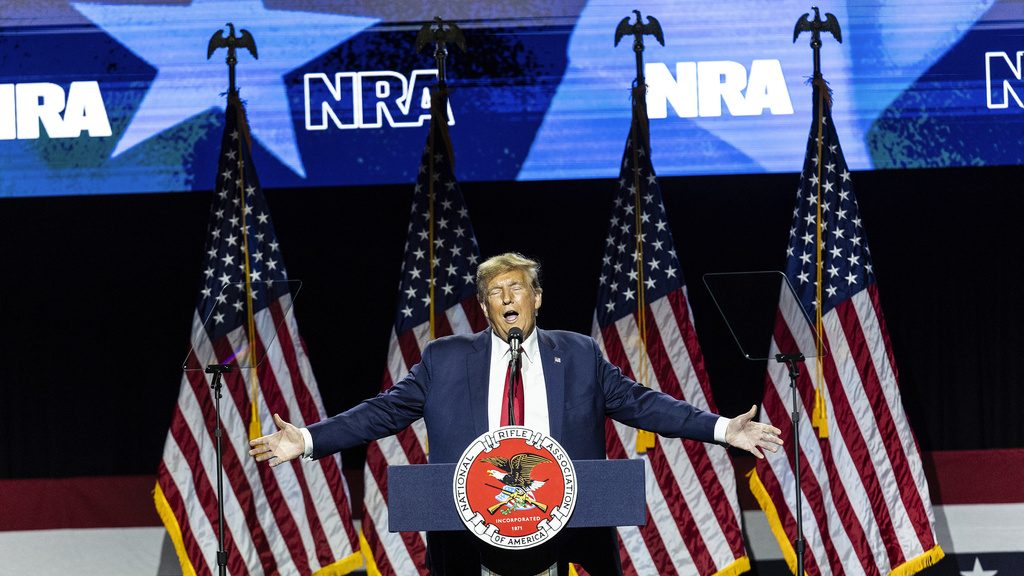
Jamelle Bouie: Trump’s dream of immunity meets its match
On Tuesday, a three-judge panel of the U.S. Court of Appeals for the District of Columbia Circuit announced its decision in the case of the United States v. Trump, on the question of the former president’s immunity — or lack thereof — to federal criminal prosecution. The panel isn’t having it.
“We cannot accept that the office of the presidency places its former occupants above the law for all time thereafter,” the opinion reads. “Former President Trump lacked any lawful discretionary authority to defy federal criminal law and he is answerable in court for his conduct,” the judges added.
Of course, this is not the end of the road for Donald Trump. He will appeal the decision, and the case will almost certainly be taken up by the Supreme Court, where our eminent tribunal will decide whether the former president is immune from criminal prosecution for illegal acts done in office under the auspices of executive authority.
It might be tempting to set the panel’s opinion aside, knowing that the story isn’t over yet. But you shouldn’t. It is a fascinating document, not least because the judges provide a full portrait of the radicalism of Trump’s claim to executive immunity.
In short, the former president says that he has “absolute immunity from criminal prosecution for all ‘official acts’ undertaken as president,” a claim that rests on the constitutional doctrine of separation of powers. As his lawyers wrote in their brief: “The president is vested with the executive power. The judicial branch may not sit in judgment, criminal or otherwise, over his exercise of that power.” The rest of the argument — from constitutional text, from history and from the practical considerations of governance — flows from that point.
It is true, the panel said, that “the Supreme Court has explained that a former president is absolutely immune from civil liability for his official acts.” This includes acts that fall within the “outer perimeter” of his official responsibilities. What Trump wants is for the courts to “extend the framework for presidential civil immunity to criminal cases and decide for the first time that a former president is categorically immune from federal criminal prosecution for any act conceivably within the outer perimeter of his executive responsibility.”
The panel said, in so many words, no. Separation of powers, it explained, does not “bar the federal criminal prosecution of a former president for every official act.” The federal judiciary, as Chief Justice John Marshall wrote in his opinion in Marbury v. Madison in 1803, can hear cases “where a specific duty is assigned by law,” meaning that federal courts can review “certain kinds of official acts — including those that are legal in nature.”
Among those official acts that are legal in nature are the president’s constitutional duty to faithfully enforce the laws, which, the panel noted, “encompasses following the legal procedures for determining election results and ensuring that executive power vests in the new president at the constitutionally appointed time.”
If the president decides, instead, to subvert those laws, then of course courts can hold him accountable. It would be perverse, to the point of undermining the idea of constitutional government itself, for the president to have the power to defy the law as he chooses.
This is especially true, the panel pointed out, when it comes to presidential elections, one of the most important checks on presidential conduct and presidential power.
This is crucial. One of the most powerful, if often shrill, arguments from the antifederalist opponents of the Constitution was that the presidency — a strong executive branch that would work in concert with a small, elitist Senate — was a ticking time bomb at the heart of republican government.
“The office of president of the United States appears to me to be clothed with such powers as are dangerous,” one such opponent, writing under the pseudonym An Old Whig, declared. The power of the presidency was so great and the esteem of the office so high, he continued, that no man would relinquish it. “It will cost a man many struggles to resign such eminent powers, and ere long, we shall find some one who will be very unwilling to part with them.” (Score one for An Old Whig.)
George Clinton, a prominent antifederalist (later governor of New York and then vice president under Thomas Jefferson and James Madison), agreed. “It is … obvious to the least intelligent mind to account why great power in the hands of a magistrate, and that power connected with a considerable duration, may be dangerous to the liberties of a republic,” Clinton, under the pseudonym Cato, wrote. “If the president is possessed of ambition,” he continued, “he has power and time sufficient to ruin this country.”
Supporters of the Constitution did not deny that the office was very powerful. But this, they explained, was why elections were so important. Rejecting the antifederalist charge that the powers of the president were indistinguishable from those of a king, Alexander Hamilton explains in Federalist 69 that “the president of the United States would be an officer elected by the people for FOUR years; the king of Great Britain is a perpetual and HEREDITARY prince. The one would be amenable to personal punishment and disgrace; the person of the other is sacred and inviolable.”
Similarly, New Jersey Federalist John Stevens Jr. argued, under the pseudonym Americanus, “From the manner in which the president is elected, it must be acknowledged, that he is amenable to the people, and that they may have him removed from office, when he misapplies the powers, with which he is entrusted.”
“It is a maxim universally true,” he concluded, “that the power, which creates, can also annihilate.”
The American system falls apart if the president, with absolute legal immunity, can interfere with the election process itself. It’s for this reason that the appeals court opinion condemns, in no uncertain terms, Trump’s assertion of unaccountable power. “We cannot accept former President Trump’s claim that a president has unbounded authority to commit crimes that would neutralize the most fundamental check on executive power — the recognition and implementation of election results.”
Trump’s claim of total executive immunity isn’t just unconstitutional; it is anti-constitutional and incompatible with the rule of law. A president with that kind of power is no longer a president but a king.
Jamelle Bouie writes a column for the New York Times.
Related Articles
David Brooks: Is the party of Reagan still in there anywhere?
Clive Crook: If Congress just did its job, the Chevron doctrine wouldn’t exist
Jenny Alvermann: Confessions of a former fully remote worker
My mom, an athlete in the pre-Title IX days, would have loved Iowa basketball phenom Caitlin Clark
Paul Krugman: Trump, immigration and the ‘lump of labor’ fallacy

